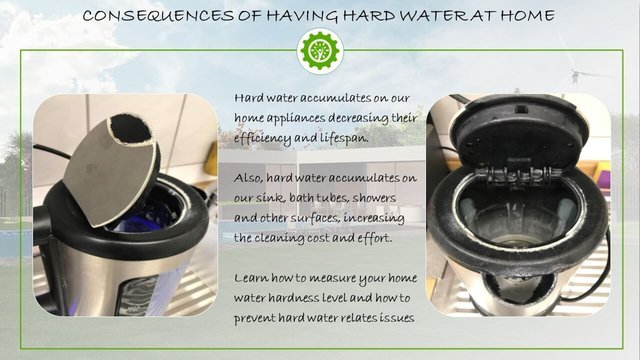
When water passes through or over limestone or chalk deposits, chalk and magnesium ions dissolve into the water and it is their presence that makes the water ‘hard’.
One of the most visual ways of knowing if your house has hard water it is by having a look to a kettle.
If your kettle looks as the one as the photo on the right, you most definitely have hard water coming from your kitchen’s tap.
Drinking hard water it does not pose a health problem so most of the people ignores the deposits on the kettle and keep it using for as long as it lasts, but as more and more scale accumulates on the heating elements the more inefficient they become and the more time and electricity is needed to boil the water.
Before installing a household water filtration system, we were cleaning the kettle once a week. Since we installed the filtration system, three years ago, we haven’t had to clean the kettle even once.
The effects on having hard water at home
Hard water it also has some effects that are not that obvious as the accumulation of limescale on a kettle. Hard water builds up the pipes causing flow and drop pressure to drop and, if the accumulation continues for a long period, it may be even necessary to replace the pipes.
Additionally, the hottest part of the house plumbing system are more prone to limestone precipitation so water heaters will be specially affected, leading to decrease of efficiency and by default an increase on the electricity usage.
Drinking hard water does not pose a health problem but, according to a study from the World Health Organization , using hard water in combination with soaps or shampoos may cause skin irritation or exacerbate eczema because hard water prevents soaps from rinsing off from the skin, causing contact irritation.
The Royal Society of Chemistry explain in an study that when soap is used in combination with hard water, a substance denominated scum is formed which does not dissolve in water and which has limited cleaning capacity. This substance, apart from the already mentioned skin irritation already mentioned, builds up on the hair causing the hair to look rough and dull and it also may damage fabrics and clothes making them scratchy.
Soap scum can also leave stains in sinks, showers, bathtubs and water fixtures as well as on shower glass which will increase the cleaning frequency and the use of cleaning chemicals.
Measuring the hard water level using a FiltraSoft test kit
We have measured our home water hardness level using a FiltraSoft test kit and found out that we have slightly hard water.
The apartment block building where we are living at the moment has a hard water filter system that reduces the water hardness level. We know that we live in an area which has quite hard water and we have proven this fact by collecting water samples from friends and colleagues who live within 50 km from our house and all of them, because they don’t have a hard water filter system, have much harder water than ours.
How to reduce water hardness level
The most efficient way to reduce water hardness is to install a household water filtration system.
This system is connected to the main water supply and that provides filtered water to the whole house. This system is relatively easy to install but it requires a little bit of handiwork and a big load of common sense. You don’t want to make a lousy installation and then get water leaking all over the place. In case of doubt, better to hire a professional or a handyman.
It may be that for some people it is not feasible to install a household filtration system, specially for those renting or living on an apartment block.
Still, there are alternatives like clamps that can be attached to the water pipes and reduce water hardness and limescale by generating a magnetic field.
For those who have noticed the negative effects on hard water while showering, because of the effects of hard water on soap, a very easy and relatively cheap solution is to install a shower head filter.
This shower head will not only support with reducing water hardness but will also decrease levels of chlorine, fluoride, toxins, heavy metals… and also will support with reducing your bathroom water consumption.
We hope you have found the information useful. If you want to know more, visit us at https://effiworkx.com/water/